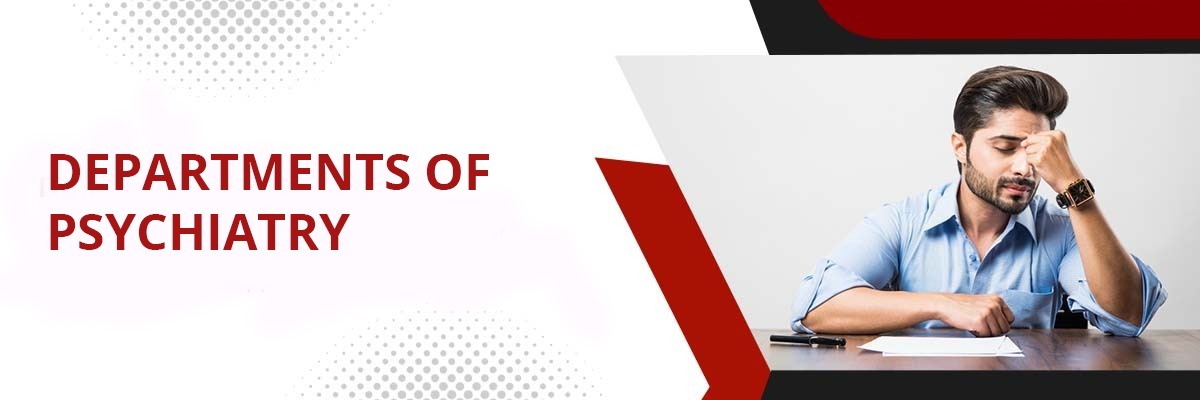

About
The depression hospital in Bareilly has a fully functional department of psychiatry with facilities for indoor and outpatient treatment of behavioral problems of adults and children. A de-addiction center for drugs and alcohol addicts is also being run. The department has full time psychiatrists and a clinical psychologist. Emergency services are provided on a 24 hour basis. Regular awareness programs are conducted for patients and attendants. Facilities for ECT, Bio-Feedback & rTMS for various anxiety disorders and psychological testing are also available. Psychological tests for diagnosis and assesment are also available.
services & facilities
At SRMS Hospital in Bareilly, we are committed to providing comprehensive and compassionate psychiatric care to individuals of all ages. Our Psychiatry Department is equipped with state-of-the-art facilities and staffed by experienced and dedicated professionals. We offer a wide range of services to address various mental health concerns. Here are some of the key services and facilities we provide:
Psychiatric Consultations: Our team of experienced psychiatrists offers thorough evaluations, diagnoses, and personalized treatment plans for individuals dealing with mental health issues.
Individual Psychotherapy: Our trained therapists provide one-on-one counseling sessions to help individuals cope with a range of mental health challenges, including anxiety, depression, trauma, and more.
Group Therapy: We offer group therapy sessions that provide a supportive and understanding environment for individuals to share their experiences, learn from others, and develop effective coping strategies.
Medication Management: Our psychiatrists are skilled in prescribing and managing medications to alleviate symptoms of various mental health disorders, such as mood disorders, psychotic disorders, and more.
Crisis Intervention: Our psychiatric team is available around the clock to provide immediate assistance and intervention in times of mental health crises.
Child and Adolescent Psychiatry: We have specialized services catering to the mental health needs of children and teenagers, addressing issues like behavioral disorders, learning disabilities, and emotional struggles.
Geriatric Psychiatry: Our services extend to the elderly population, addressing age-related mental health concerns and providing support for conditions such as dementia and late-life depression.
Electroconvulsive Therapy (ECT): We offer ECT as a safe and effective treatment option for severe mental illnesses, particularly when other treatments have proven ineffective.
Biofeedback and Relaxation Techniques: Our facility offers biofeedback training and relaxation techniques to help individuals manage stress, anxiety, and other related issues.
24/7 Inpatient Care: We have dedicated inpatient psychiatric units with round-the-clock care for individuals requiring intensive treatment and monitoring.
Treatments
Psychiatry encompasses a wide range of mental health conditions, and treatments can vary depending on the specific diagnosis, severity of symptoms, and individual patient factors. Here are some common treatments used in psychiatry:
Psychotherapy:
- Cognitive Behavioral Therapy (CBT): Focuses on identifying and changing negative thought patterns and behaviors. It’s effective for a variety of conditions, including depression, anxiety, and eating disorders.
- Dialectical Behavioral Therapy (DBT): Originally developed for borderline personality disorder, DBT combines cognitive behavioral techniques with mindfulness and acceptance strategies.
- Psychodynamic Therapy: Explores unconscious processes and past experiences to understand and resolve current psychological issues.
- Interpersonal Therapy (IPT): A time-limited therapy that addresses interpersonal issues and communication patterns, often used for depression.
Medication:
- Antidepressants: SSRIs, SNRIs, MAOIs, and tricyclic antidepressants are commonly prescribed for depression and some anxiety disorders.
- Antianxiety Medications: Benzodiazepines and certain antidepressants can help manage anxiety and panic disorders.
- Antipsychotic Medications: These are used to treat conditions like schizophrenia and bipolar disorder, helping to reduce hallucinations, delusions, and mood fluctuations.
- Mood Stabilizers: Used primarily for bipolar disorder to manage mood swings and prevent both manic and depressive episodes.
- Stimulants and Non-Stimulants: Prescribed for attention-deficit/hyperactivity disorder (ADHD) to improve focus and impulse control.
Electroconvulsive Therapy (ECT):
- Used for severe depression or certain cases of schizophrenia and bipolar disorder. ECT involves inducing controlled seizures through electrical currents to the brain.
Transcranial Magnetic Stimulation (TMS):
- A non-invasive procedure that uses magnetic fields to stimulate nerve cells in the brain. It’s often used for treatment-resistant depression.
Vagus Nerve Stimulation (VNS):
- A surgically implanted device that stimulates the vagus nerve, which can help manage treatment-resistant depression and epilepsy.
Deep Brain Stimulation (DBS):
- Involves surgically implanting electrodes in specific brain areas and delivering electrical impulses to modulate abnormal brain activity. Used in some cases of severe obsessive-compulsive disorder (OCD) and depression.
Lifestyle Interventions:
- Regular exercise, healthy diet, sleep hygiene, and stress management techniques are important for maintaining mental well-being.
Holistic Approaches:
- Practices like yoga, meditation, mindfulness, and art therapy can complement traditional treatments and promote mental wellness.
Support Groups and Peer Support:
- Connecting with others who have similar experiences can provide valuable emotional support and coping strategies.







